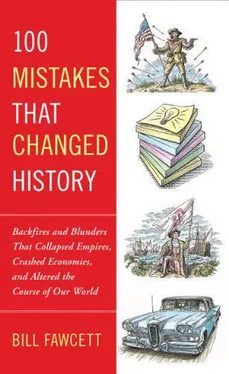James Buchanan had been a really good trial lawyer and made a fortune at it. This was good as it gave him something to live on after being one of the worst U.S. presidents ever. He could not have come along at a worse time. When the problem of slavery had begun to overwhelm all other issues and split the nation, he proved to be a weak hand on the rudder of the ship of state. The former lawyer really got elected more for where he was during the election of 1856 than for who he was or what he stood for. While everyone else had gotten soiled over the violence resulting from the Kansas-Nebraska Act, Buchanan was ambassador to England. This made him just about the only generally popular and untarnished candidate the Democrats could field. The new Republican Party did well, but the Democratic machine managed to win just one more time. The problem then was that Buchanan had no idea what was going on. Once president, he was indecisive, and he fluctuated between proslavery and antislavery positions until he had alienated both sides. One is hard put to find any substantial accomplishments in any area by Buchanan, even at a time when the United States was tearing itself apart.
In a list of the worst presidents in history, all three from the 1850s make the top ten. Some argue James Buchanan was the worst while other historians hold out for Franklin Pierce. All three were totally ineffective at dealing with the most pressing problem of their day. By the time Abraham Lincoln replaced Buchanan as president, the nation was divided and was soon at war with itself. Three men who led the nation did nothing, and by doing nothing, they doomed the United States to a civil war and hundreds of thousands of deaths.
The Man Who Prolonged the Civil War
1861
More than 600,000 men on both sides died in the American Civil War. The war lasted nearly five years and devastated much of the southern United States. Had the Union won the first battle of the war, there is a good chance that the war might have ended within weeks when compromises were still possible. In the first battles of the Civil War, both sides struggled to understand command and maneuver. But one side was better armed than the other, and that helped make a difference.
Because of the Union’s greater industrial capabilities, most people today are under the impression that the Union Army was always better equipped. This was certainly the case by 1862, but due to a mistake made by James Wolfe Ripley, as the chief of ordnance, this was not true at the start of the war.
In July 1861, Ripley took over the office that purchased all of the weapons and equipment used by the Union Army and Navy. He was sixty-seven years old at the time he was appointed chief. He had fought in the War of 1812, against the Creek and Seminole tribes under Andrew Jackson, and more recently in the Mexican War. He also had been working with ordnance and supply for more than thirty years before he became the top decision maker in that office. He was brought in because his predecessor was inefficient and unable to change with the times. Unfortunately for the Union armies, Ripley proved worse.
Just as the war started and before the Battle of Bull Run (Manassas Creek), the British had completed changing over most of their army to using a new Enfield rifle. This left them with warehouses full of almost 100,000 perfectly usable rifled muskets. The British immediately contacted Ripley, as it was apparent that the U.S. government was going to need a lot of weapons quickly, and offered them to him. The mistake was that Ripley immediately and adamantly turned down the offer.
There were probably a number of reasons that the chief of ordnance did not take the British muskets. It cannot be forgotten that he had actually fought against the British in the War of 1812. Also, there was national pride. The stated reason that he turned down the weapons was “Buy American.” There is also the suspicion that Ripley stood to personally gain by limiting all purchases to American-made weapons. He held some ownership in a U.S.-based weapons company. But the real reason, his later actions showed, was that the man who determined for two years what the Union Army fought with was simply hidebound and opposed to any change.
When Ripley turned down the British weapons, they were quickly snatched up by the Confederacy. This meant that for the first months of the war, while Union units struggled with getting the right ammunition for a range of mismatched muskets, the Confederate troops were almost all armed with fairly modern muskets of the same caliber. They were, for those first months, better armed and more easily supplied than the Union soldiers they fought.
James Wolfe Ripley continued in his stubborn resistance to new ideas and weapons until removed from the top position in September 1863. In those two years, he resisted breech-loading weapons, refused to buy the Spencer or other repeating rifles, and kept the army from purchasing any substantial number of Gatling guns. Ripley did not cost the North a victory, but he made it harder to achieve by denying his side the most modern weapons and equipment. And it seemed he did this for no reason other than his own aversion to anything new or different. In a war that marked the beginning of modern technological warfare, Chief of Ordnance Ripley’s decisions slowed a Union victory more than the mistakes of any one general.
52. TECH FAILURE AND PANIC
Fear of the Unknown
1863
If it had not been for a lightning strike, the American Civil War might have ended in 1863 with Joseph Hooker considered one of the great generals in history. The problem that helped doom Hooker, and partially cost the Union a victory at Chancellorsville, is one that is also a cautionary tale of depending on new and untested technology in battle.
The Army of the Potomac went through a lot of generals in the first years of the American Civil War. Among those generals was “Fighting” Joseph Hooker. He was in command at the Battle of Chancellorsville, which took place in late April 1863. There were a lot of reasons for the Union defeat, including the brilliant flank march in which Stonewall Jackson died. But preeminent among the reasons for the Union Army being defeated, historians agree, was a loss of nerve by General Hooker.
Hooker’s battle plan was excellent and had a good chance of defeating Robert E. Lee. It made use of the Union’s superior numbers to pin the bulk of the Army of Virginia while flanking it with the rest of the larger army. Hooker had been given a number of the new Beardslee Patent Magneto-Electric Field Telegraph Machines to send commands. These early telegraph units used a hand crank and no battery. One of the problems with these almost untested devices was that they used a visual display on a moving dial to send letters and not Morse Code. Because of this, the telegraphs were easily thrown out of adjustment, making all future messages gibberish. They also had a range of only seven miles between machines. The short range meant that messages had to be relayed between stations established along the line of march. Every seven miles there had to be an operator who read a message and then passed it on to the next machine. For a twenty-one-mile message, they needed four trained operators. Setting up a string of sensitive Beardslees during a battle was no easy task, considering the machine itself weighed a hundred pounds, and it used a heavy copper cable that was easily grounded and decayed over a matter of just weeks. During the Chancellorsville battle, in their haste to get a line set up, old cable had been reused. This further garbled signals, and then one of the awkward machines was found to have been hit by lightning and could not be repaired anywhere closer than New York City. Hooker had been led to believe his communications with his generals would be almost instantaneous; instead, they proved to be almost nonexistent.
Читать дальше












